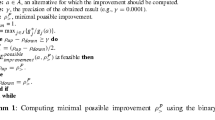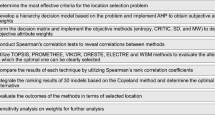Abstract
In this paper, a multi-criteria approach for ranking the Municipalities of the States of Mexico by their levels of marginalization is proposed, and the case for the State of Jalisco is presented. The approach uses the ELECTRE III method to construct a medium-sized valued outranking relation and then employs a new multi-objective evolutionary algorithm (MOEA) based on non-dominated sorting genetic algorithm II (NSGA-II) to exploit the relation to obtain a recommendation. The results of this application can be useful for policy-makers, planners, academics, investors, and business leaders. This study also contributes to an important, yet relatively new, body of application-based literature that investigates multi-criteria approaches to decision making that use fuzzy theory and evolutionary multi-objective optimization methods. A comparison of the ranking obtained with the proposed methodology and the stratifications created by the National Population Council of Mexico shows that the methodology presented consistent and reliable results for this problem.
Access this chapter
Tax calculation will be finalised at checkout
Purchases are for personal use only
Preview
Unable to display preview. Download preview PDF.
Similar content being viewed by others
References
CONAPO: Índice de marginación por entidad federativa y municipio (2010) (retrieved from) http://www.conapo.gob.mx/work/models/CONAPO/indices_margina/mf2010/CapitulosPDF/1_4.pdf (2011)
De Smet, Y., Eppe, S.: Multicriteria Relational Clustering: The Case of Binary Outranking Matrices. In: Ehrgott, M., Fonseca, C.M., Gandibleux, X., Hao, J.-K., Sevaux, M. (eds.) EMO 2009. LNCS, vol. 5467, pp. 380–392. Springer, Heidelberg (2009)
Deb, K., Pratap, A., Agarwal, S., Meyarivan, T.: A fast and elitist multiobjective genetic algorithm: NSGA-II. IEEE Transactions on Evolutionary Computation 6(2), 182–197 (2002)
Figueira, J., Greco, S., Roy, B., Slowinski, R.: An Overview of ELECTRE Methods and their Recent Extensions. Journal of Multi-Criteria Decision Analysis 20(1–2), 61–85 (2013)
Fodor, J., Roubens, M.: Fuzzy Preference Modeling and Multicriteria Decision Support. Kluwer Academic Publishers, Dordrecht (1994)
Gatzweiler, F., Baumüller, H., Ladenburger, C., Joachim, V.B.: Marginality: Addressing the Nexus of Poverty, Exclusion and Ecology. Springer (2014)
Gatzweiler, F.W., Baumüller, H., Ladenburger, C., von Braun, J.: Marginality: addressing the root causes of extreme poverty. ZEF working paper 77, Center for Development Research, University of Bonn, Bonn (2011)
Leyva, J.C., Solano, J., Gastelum, D., Sanchez M.: A multiobjective evolutionary approach to a medium-sized multicriteria ranking problem. In: Leyva López, J.C., Espin Andrade, R., Bello Pérez, R., Álvarez Carrillo, P.A. (eds) Studies on Knowledge Discovery, Knowledge Management, and Decision Making, pp. 188-197. Atlantis Press, Eureka, Mazatlán, México (2013)
Park, Y.J., Song, M.S.: A genetic algorithm for clustering problems. In: Proceedings of the Third Annual Conference on Genetic Programming, pp. 568–575, July 22–25. University of Wisconsin, M. Kaufmann Publishers Madison (1998)
Roy, B.: The outranking approach and the foundations of ELECTRE methods. In: Bana e Costa, C.A. (ed.) Readings in Multiple Criteria Decision Aid, pp. 155–183. Springer, Berlin (1990).
Roy, B., Bouyssou, D.: Aide multicritère à la décision: Méthodes et cas. Economica, mai, Paris (1993)
Roy, B.: Multi-criteria Methodology for Decision Aiding. Kluwer Academic Publishers, Dordrecht (1996)
Roy, B.: The outranking approach and the foundations of ELECTRE methods. Theory and Decision 31, 49–73 (1991)
Author information
Authors and Affiliations
Corresponding author
Editor information
Editors and Affiliations
Rights and permissions
Copyright information
© 2015 Springer International Publishing Switzerland
About this paper
Cite this paper
Noriega, J.J.S., López, J.C.L., Chavira, D.A.G. (2015). Marginalization in Mexico: An Application of the ELECTRE III–MOEA Methodology. In: Gaspar-Cunha, A., Henggeler Antunes, C., Coello, C. (eds) Evolutionary Multi-Criterion Optimization. EMO 2015. Lecture Notes in Computer Science(), vol 9019. Springer, Cham. https://doi.org/10.1007/978-3-319-15892-1_32
Download citation
DOI: https://doi.org/10.1007/978-3-319-15892-1_32
Published:
Publisher Name: Springer, Cham
Print ISBN: 978-3-319-15891-4
Online ISBN: 978-3-319-15892-1
eBook Packages: Computer ScienceComputer Science (R0)




